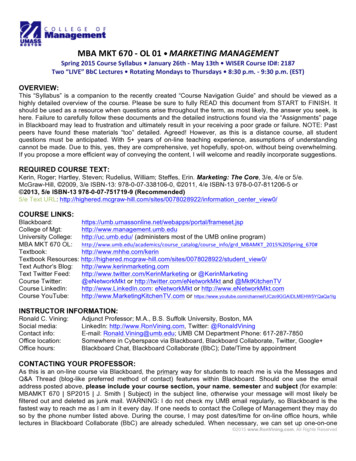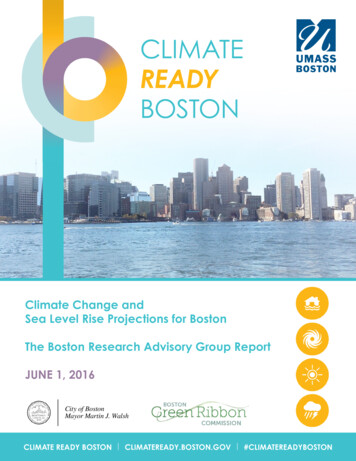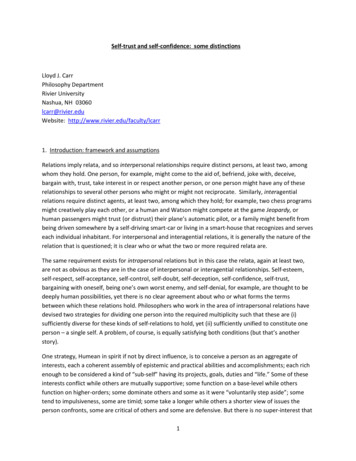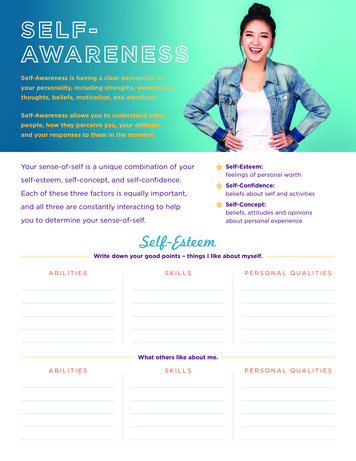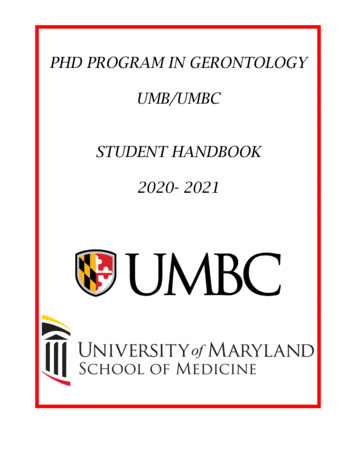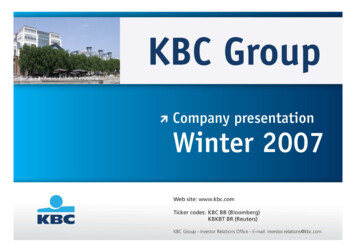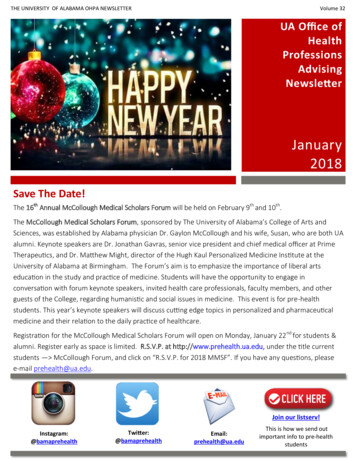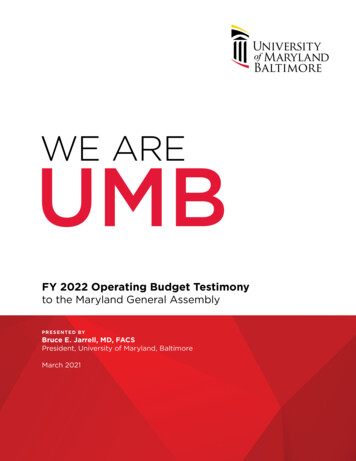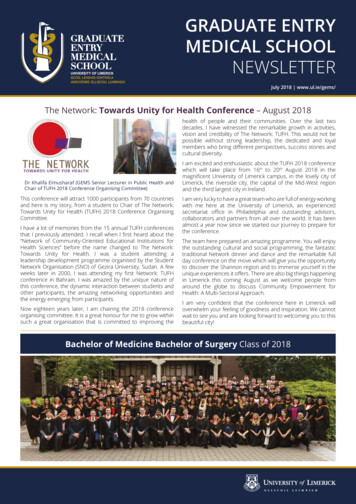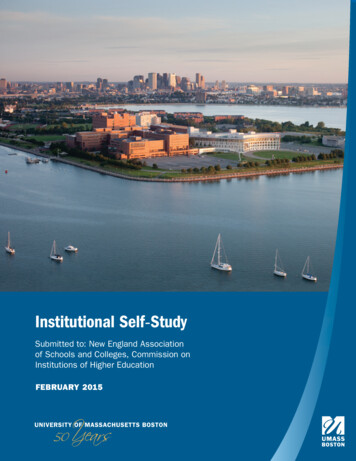
Transcription
Institutional Self-StudySubmitted to: New England Associationof Schools and Colleges, Commission onInstitutions of Higher EducationFEBRUARY 2015
UNIVERSITY OF MASSACHUSETTS BOSTONInstitutional Self-StudySubmitted to: New England Association of Schools andColleges, Commission on Institutions of Higher EducationFebruary 2015
Table of ContentsInstitutional Characteristics FormOrganizational ChartTable of CIHE Items of Special AttentionIntroductionSteering Committee and Task Force MembersOverviewStandard One: Mission and PurposesStandard Two: Planning and EvaluationStandard Three: Organization and GovernanceStandard Four: The Academic ProgramStandard Five: FacultyStandard Six: StudentsStandard Seven: Library and Other Information ResourcesStandard Eight: Physical and Technological ResourcesStandard Nine: Financial ResourcesStandard Ten: Public DisclosureStandard Eleven: IntegrityAppendixAffirmation of ComplianceE formsS formsList of supporting documentsMost recent audited financial statementAuditor’s management letteriiixixiixiiixv13615203847616878869197
Institutional Characteristics FormThis form is to be completed and placed at the beginning of the self-study report:Date: February 20, 2015Corporate name of institution: University of Massachusetts Boston1.Date institution was chartered or authorized:19642.Date institution enrolled first students in degree programs:19653.Date institution awarded first degrees:19654.Type of control:PublicPrivateStateIndependent, not-for-profitCityReligious GroupOther(Name of Church)(Specify)ProprietaryOther: (Specify)5.By what agency is the institution legally authorized to provide a program of education beyondhigh school, and what degrees is it authorized to grant? The General Laws of Massachusetts, Chapter75, Section 2 authorizes the university to offer bachelors, masters, and doctoral degrees6.Level of postsecondary offering (check all that apply)Less than one year of workFirst professional degreeAt least one but less than two yearsMaster’s and/or work beyond the firstprofessional degreeDiploma or certificate programs ofat least two but less than four yearsWork beyond the master’s levelbut not at the doctoral level(e.g., Specialist in Education)Associate degree granting programof at least two yearsA doctor of philosophy orequivalent degreeFour- or five-year baccalaureatedegree granting programOther doctoral programsOther (Specify)ii
7.8.Type of undergraduate programs (check all that apply)Occupational training at thecrafts/clerical level (certificateor diploma)Liberal arts and generalOccupational training at the technicalor semi-professional level(degree)Teacher preparatoryTwo-year programs designed forfull transfer to a baccalaureatedegreeProfessionalThe calendar system at the institution is:Semester10.11.QuarterTrimesterOtherWhat constitutes the credit hour load for a full-time equivalent (FTE) student each semester?a)Undergraduate15 credit hoursb)Graduate9c)Professional-credit hourscredit hoursStudent population: Fall 2014a)Degree-seeking students:Full-time student headcountPart-time student 2299121139803.472494.67Number of students (headcount) in non-credit, short-term courses: 1,045List all programs accredited by a nationally recognized, specialized accrediting agency.iiiTotal10389510412298.14
Addictions Counselor Education Program CertificateNational Council on Problem GamblingAddictions Counselor Education Program CertificateLicensed Alcohol and Drug CounselorApplied Behavior Analysis for Special PopulationsGraduate CertificateBehavior Analyst Certification Board(BACB)Applied Behavior Analysis for Special PopulationsGraduate CertificateBehavior Analyst Certification Board:School Psychology Approved CourseSequenceChemistry, B.S.American Chemical Society (ACS)Computer Science, B.S.Computing Accreditation Commission ofAccreditation Board for Engineering andTechnology (ABET)College of ManagementAssociation to Advance Collegiate Schools ofBusiness (AACSB)B.S. in ManagementMaster of Bus AdminM.S. in AccountingM.S. in Info TechnologyM.S. in International MgtB.S. in Info TechnologyM.S. in FinancePh.D. in ManagementCollege of Nursing and Health SciencesPrograms:Commission on Collegiate Nursing Education(CCNE)Baccalaureate Degree programs:Generic and Accelerated pre-licensure;Master’s Degree programs: Acute Care ClinicalNurse Specialist, Adult-Gerontological NursePractitioner and Family Nurse PractitionerDoctor of Nursing Practice (D.N.P.)Board of Registration in Nursing,Commonwealth of MassachusettsLeadership in Education AdministrationMassachusetts Department of Elementary andSecondary Education (DESE)Leadership in Urban SchoolsUniversity Council for EducationalAdministrationSchool Counseling, M.Ed.Massachusetts Department of Elementary andSecondary Education (DESE): Master’s inPsychology and CounselingAccreditation Council (MPCAC)Mental Health CounselingCounseling Psychology, Ph.D.Master’s Counseling Accreditation Council(MCAC)American Psychological Association (APA)School Psychology, Ph.D.American Psychological Association (APA)iv
Teacher Education programs in Curriculum &InstructionMassachusetts Department of Elementary andSecondary EducationCurriculum & Instruction Teacher Education ProgramsCouncil for the Accreditation of EducatorPreparation, Teacher Education AccreditationCouncil (TEAC)Family Therapy, M.S.Specialist in School Psychology, M.Ed., Ed.S.Commission on Accreditation for Marriageand Family Therapy EducationNational Association of School PsychologistsClinical Psychology, Ph.D.American Psychological Association (APA)Rehabilitation Counseling, M.S.Council on Rehabilitation EducationVision Studies-Teacher of Students with VisualImpairment (TVI), Orientation and Mobility (O&M),Vision Rehabilitation Therapy (VRT)Council for Exceptional Children (CEC);Academy for Certification of VisionRehabilitation and Education Professionals(ACVREP); Teacher Education AccreditationCouncil (TEAC)13.Off-campus Locations. List all instructional locations other than the main campus. For each site,indicate whether the location offers full-degree programs or 50% or more of one or more degreeprograms. Record the full-time equivalent enrollment (FTE) for the most recent year.Add more rows as needed.Full degree50%-99%FTEA. In-state LocationsCape Cod Community CollegeRN-BSN11.6B. Out-of-state LocationsNone14. International Locations: For each overseas instructional location, indicate the name of the program, thelocation, and the headcount of students enrolled for the most recent year. An overseas instructionallocation is defined as “any overseas location of an institution, other than the main campus, at which theinstitution matriculates students to whom it offers any portion of a degree program or offers on-siteinstruction or instructional support for students enrolled in a predominantly or totally on-line program.”Do not include study abroad locations.Name of program(s)LocationHeadcountNone15. Degrees and certificates offered 50% or more electronically: For each degree or Title IV-eligiblecertificate, indicate the level (certificate, associate’s, baccalaureate, master’s, professional, doctoral),v
the percentage of credits that may be completed on-line, and the FTE of matriculated students for themost recent year. Enter more rows as needed.Name of programDegree level% on-lineHeadcountFrank J. Manning CertificateCertificate100%-Gerontological Social PolicyCertificate100%5Spanish/English TranslationCertificate100%21Adult/Gerontology and Family Nurse CertificatePractitioner100%134Business AnalyticsCertificate100%12Evaluation in ResearchCertificate100%-Clinical Nurse SpecialistCertificate100%2Critical and Creative 4Global Post-Disaster StudiesCertificate100%2Healthcare InformaticsCertificate100%6Instructional Technology DesignCertificate100%23International DevelopmentCertificate100%1Orientation and Mobility CertificateCertificate100%10Science in a Changing WorldCertificate100%-Vision Rehabilitation TherapyCertificate100%-Global AffairsBaccalaureate100%5Nursing for Registered NursesBaccalaureate100%530Applied LinguisticsMaster’s100%168Critical and Creative ThinkingMaster’s100%27Family TherapyMaster’s100%45Instructional DesignMaster’s100%101Management of Aging ServicesMaster’s100%108Mental Health CounselingMaster’s100%93Rehabilitation CounselingMaster’s100%31School CounselingMaster’s100%65Science in a Changing WorldMaster’s100%-Vision 43Teacher ofImpairmentsStudentsDoctor of Nursing PracticewithVisualvi
16.Instruction offered through contractual relationships: For each contractual relationship throughwhich instruction is offered for a Title IV-eligible degree or certificate, indicate the name of thecontractor, the location of instruction, the program name, and degree or certificate, and the number ofcredits that may be completed through the contractual relationship. Enter more rows as needed.Name of contractorLocationName of programDegree or certificate# ofcreditsNone17.List by name and title the chief administrative officers of the institution.CHIEF INSTITUTIONAL OFFICERSFunction or OfficeNameExact TitleYear ofAppointmentChair Board ofTrusteesVictor WoolridgeChair2015President/CEOJ. Keith MotleyChancellor2007Chief AcademicOfficerWinston LangleyProvost and ViceChancellor for AcademicAffairs2008Chief FinancialOfficerEllen O’ConnorVice Chancellor forAdministration andFinance2004Chief Student ServicesOfficerLisa BuenaventuraVice Chancellor forStudent Affairs2013EnrollmentManagementLisa JohnsonVice Chancellor forEnrollment Management2014Government Relationsand Public AffairsEdward Lambert, Jr.Vice Chancellor forGovernment Relations andPublic Affairs2013AthleticsCharlie TitusVice Chancellor forAthletics & Recreation/Special Programs &Projects2005DevelopmentGina CappelloVice Chancellor forUniversity Advancement2012James Overtonvii2013
Deans of Schools andCollegesCollege of Advancingand ProfessionalStudiesPhilip DiSalvioDean2011College of Education& HumanDevelopmentMichael MiddletonDean2014College of LiberalArtsDavid TerklaDean2014College ofManagementJorge HaddockDean2014College of Nursing &Health SciencesAnahid KulwickiDean2012College of Public &Community ServiceAnna MadisonDean2011College of Science &MathematicsAndrew GrosovskyDean2007Honors CollegeRajini SrikanthDean2013McCormack GraduateSchool of Policy andGlobal StudiesIra JacksonDean2013School of GlobalInclusion & SocialDevelopmentWilliam KiernanDean2012School for theEnvironmentRobyn HanniganDean2013LibraryDaniel Ortiz-ZapataDean of UniversityLibraries2012Provost’s OfficeEmily McDermottDean of the Faculty2015Provost’s OfficeKristy AlsterAssociate Provost2007Provost’s OfficePeter LangerAssociate Provost2002Institutional ResearchJennifer BrownDirector of InstitutionalResearch and PolicyStudies1999viii
Chief InformationOfficerApurva MehtaVice Provost forInformation Technologyand Chief InformationOfficer2013Grants/ResearchZong-Guo XiaVice Provost for Research& Strategic Initiatives, andDean of Graduate Studies2009Academic SupportServicesJoan BeckerVice Provost forAcademic SupportServices2008Global ProgramsSchuyler KorbanVice Provost & Directorof the Office of GlobalPrograms2013UndergraduateAdmissionsJohn DrewDirector2009Graduate AdmissionsPeggy Roldan PatelDirector2006RegistrarDavid CesarioUniversity Registrar1980Financial AidJudith KeyesDirector for StudentFinancial Management2003Alumni AssociationMaureen MeltonPresident2014Human ResourcesBecky HsuAssistant Vice Chancellorfor Human Resources2013Budget & FinancialPlanningSusan WolfeAssistant Vice Chancellorfor Budget and FinancialPlanning2012CommunicationsDeWayne LehmanDirector ofCommunications2008Diversity & InclusionGeorgianna MeléndezChief Diversity Officer2013Chancellor’s OfficeChristopher HoganChief of Staff2007Chancellor’s OfficeTheresa MortimerAssistant Chancellor2008Chancellor’s OfficeSteven NevilleSpecial Assistant to theChancellor200918.Supply a table of organization for the institution:(See attached.)ix
19.Record briefly the central elements in the history of the institution:1964: University of Massachusetts Boston authorized by act of the General Court.1965: Campus opened in buildings in downtown Boston.1969: First UMass Boston commencement.1972: Trustees authorized first graduate program (MS in chemistry).1974: First classes at newly constructed harbor campus at Columbia Point.1980: Trustees authorized granting of the Bachelor of Science degree.1981: Trustees authorized first doctoral program (Ph.D. in environmental sciences).1982: Boston State College merged with UMass Boston.1992: Downtown campus closed.2004: Campus Center opened.2006: University received Carnegie Community Engagement classification2010: University purchased the site of the former Bayside Exposition Center.2011: University received Carnegie “Research University (High Research Activity)” classification.2015: Integrated Sciences Complex opened.x
Office of Diversityand InclusionMcCormack Grad.School of Policyand Global StudiesCollege of Publicand CommunityServiceCollege ofAdvancing andProfessionalStudiesSchool for GlobalInclusion and SocialDevelopmentHonors CollegeOffice of GlobalProgramsSchool for theEnvironmentInstructionalTechnologyServicesOne Stop StudentServices CenterCollege of Nursingand HealthSciencesUniversity LibrariesRegistrar's OfficeCollege ofManagementTransfer esMerit ScholarshipFinancial AidVeteran's ice Chancellor forEnrollmentManagementCollege of Scienceand MathematicsCollege of LiberalArtsCollege ofEducation andHumanDevelopmentInstitutionalResearch andPolicy StudiesCenters andInstitutesResearch, StrategicInitiatives andGraduate StudiesAcademic SupportServices andUndergraduateStudiesProvost and ViceChancellor forAcademic AffairsSpecial EventsChief of StaffAthletic FacilitiesRecreationSpecial Programsand ProjectsAthleticsxiVice Chancellor forAthletics andRecreation; SpecialPrograms and ProjectsCustomer ServiceCampus MasterPlanningCampus ServicesFacilitiesHuman ResourcesContracts andComplianceController(Bursar)Budget andFinancial PlanningVice Chancellor forAdministration cementServicesAnnual FundMajor GiftsCorporate andFoundation RelationsAlumni AffairsVice Chancellor forUniversityAdvancementInterfaith CampusMinistryUrban and OffCampus SupportServicesStudent HousingPublic SafetyEarly LearningCenterStudent Activitiesand LeadershipHealth ServicesStudent Leadershipand CommunityEngagementDean of StudentsVice Chancellor forStudent AffairsAssistant ChancellorRadio StationWUMBCommunityPartnershipsUniversity ce Chancellor forGovernment Relations,Public Affairs andEconomic Development
Table of Items Included for Emphasis in the Self-Studyas Requested by CIHE in the June 8, 2010Acceptance of the University’s Fifth-Year Interim ReportItemDeveloping course and program assessmentthat provides evidence for revisions to thecurriculumAddressing the institution’s goals for reducingdependence on part-time faculty and forincreasing the number of tenure-track facultyContinuing to improve enrollment, retention,and graduation ratesAddressing challenges with funding,particularly in light of the institution’sambitious goalsSelf-Study LocationStandard 4, pp 25-35Exhibits accompanying Standard 4Standard 5, pp 38-43Standard 6, pp 47-57Standard 2, pp 10-12Standard 9, pp 78-85xii
IntroductionTwo activities have proceeded concurrently with our institutional reaccreditation process: acelebration of the 50th anniversary of the founding of UMass Boston and an assessment ofprogress made during the 2010-2015 phase of the university’s strategic plan. Work on this selfstudy has been intertwined with these activities, and all three have contributed to moving theuniversity forward.In 2013, a Steering Committee of eleven faculty members and administrators was formed toguide the reaccreditation process. Members of the Steering Committee chaired or co-chairedeleven task forces, each charged with developing a working draft for one of the accreditationstandards. Four members of the Steering Committee attended the self-study workshop held bythe NEASC Commission on Higher Education in October 2013. In December 2013, CommissionSenior Vice President Pat O’Brien came to UMass Boston and gave overviews of theaccreditation process to the Steering Committee and to the Chancellor’s Executive LeadershipTeam. As these presentations encouraged them to do, the chairs of the task forces emphasized tothe task force volunteers the importance in the self-study of candor and evidence. The eleventask forces eventually totaled 125 members, reflecting a variety of viewpoints and a mix ofadministrators, faculty, staff, and students.During 2013-2014, the Steering Committee met regularly to allow task force chairs to askquestions of one another, share information, and come to consensus about overall strengths andareas of concern that the self-study should address. The task forces consulted and interviewedmany people on campus who provided data, shared experiences, or otherwise contributed to thecollective endeavor. The Steering Committee worked to present all issues raised by the campuscommunity in the appraisal sections of the self-study while developing projections, incollaboration with senior administrators, to deal with central concerns. We have already takenaction on many of the concerns; the projections set forth steps for continuing work aligned withour strategic plan and other university initiatives.During fall 2014, drafts of self-study sections were reviewed by the Steering Committee andwent through multiple revisions. A working draft representing all standards was then put on theuniversity’s website for comments from the community. The Steering Committee madepresentations to the Faculty Council, student government organizations, and academicdepartments, and also at a special open meeting in November 2014, to solicit comments aboutthe working draft. Chancellor Motley, Provost Langley, and the rest of the Executive LeadershipTeam reviewed the draft and made comments and suggestions. In response, a final draft with anoverview was completed in January 2014. The overview is an essential part of the narrative andsummarizes the main theme of the self-study: UMass Boston’s transformation to an increasinglysophisticated research university that remains true to its origins as a teaching institution with acommitment to public service.Documents related to the reaccreditation process and the self-study are on our web site with anopportunity for comments: http://www.umb.edu/the university/accreditation. We hope that thepublic will learn as much about the university from this self-study as we have learned aboutourselves during its creation.xiii
Acknowledgments:Chancellor J. Keith Motley and Provost and Vice Chancellor for Academic Affairs WinstonLangley provided leadership and support throughout the self-study process. Jennifer Brown andstaff in the Office of Institutional Research and Policy Studies provided much of the necessarydata as well as contributing as task force members. Maura Mast contributed beyond her role aschair of one of the task forces to assist in the data-gathering and editing of drafts of thestandards. James Mortenson, director of communications for the Office of Research andGraduate Studies, handled many tasks—working on the website, turning supporting documentsand reports into web pages that could be linked in the self-study, and managing the finalproduction of the document. Retired university editor Jeffrey Mitchell provided invaluableassistance editing this self-study. Much of the coherence and clarity in this document is due tohis time, effort, and keen eye and mind.This self-study is the product of the thoughtful work of the members of the task forces. Thanks tothem all.Peter Langer, Associate ProvostChair, Self-Study Steering Committeexiv
Reaccreditation Steering Committee and Task ForcesSteering CommitteePeter Langer (Chair)Jane AdamsJennifer BrownNeal BrussLisa BuenaventuraJavier CrespoDeWayne LehmanMaura MastGeorgianna MelendezDavid TerklaLaura E Vanderberg*Susan WolfeSusan WolfsonAssociate ProvostProfessor and Chair, PsychologyDirector of Institutional Research and Policy StudiesAssociate Professor, EnglishInterim Vice Chancellor for Student AffairsAssociate University LibrarianDirector of CommunicationsAssociate Vice Provost for Undergraduate StudiesInterim Chief Diversity OfficerDean, College of Liberal ArtsAssistant Dean, Assessment and Planning, College of Educationand Human DevelopmentAssistant Vice Chancellor for Budget and Financial PlanningDirector of Campus Master PlanningTask ForcesStandard One: Mission and PurposesPeter Langer (Co-Chair)Associate ProvostStephen Silliman (Co-Chair) Professor, Anthropology; Graduate Program Director, HistoricalArchaeology MA ProgramVirginia PerelsonDirector, Ross CenterMickaella PerinaAssociate Professor and Chair, PhilosophyMaureen ScullyAssociate Professor, Management and MarketingPaul WatanabeAssociate Professor, Political Science; Director, Institute for AsianAmerican StudiesZong-Guo XiaVice Provost for Research and Strategic Initiatives, and Dean ofGraduate StudiesStandard Two: Planning and EvaluationJennifer Brown (Chair)Director of Institutional Research and Policy StudiesRonald BennettSenior Administrator, MIS and Management ReportingMarsha FlorioSenior Assistant to the Vice Chancellor for Athletics andRecreation, Special Programs, and ProjectsKirsten GrueterSenior Budget and Policy AnalystRaymond LiuProfessor, Management and MarketingJean MacDonaldDirector of Training and Organizational DevelopmentAnne-Marie McLaughlinEmergency Manager, Administration and FinanceLuciano RamosDirector of Community PartnershipsMarietta SchwartzAssociate Dean, College of Science and MathematicsLaura E Vanderberg*Assistant Dean, Assessment and Planning, College of Educationand Human Developmentxv
Standard Three: Organization and GovernanceMaura Mast (Chair)Associate Vice Provost for Undergraduate StudiesKristine AlsterAssociate ProvostRay FrankeAssistant Professor, Leadership in EducationMichael MahanSenior Academic AdvisorNolan O’BrienStudent TrusteeManickam SugumaranProfessor, Biology; Chair, Faculty CouncilStandard Four: The Academic ProgramNeal Bruss (Co-Chair)Associate Professor, EnglishStephanie HartwellSenior Associate Dean of Graduate Studies(Co-Chair)Gail Stubbs (Co-Chair)Assistant Vice Provost, Academic Support Services andUndergraduate StudiesAnn BlumAssociate Professor, Latin American and Iberian StudiesJeffrey BurrChair, Gerontology PhD ProgramAlan ChristianAssociate Professor, Biology and School for the Environment;Director, Environmental StudiesValerie CorrenteAssociate Director of Enrollment ServicesJohn DuffAssociate Professor, School for the EnvironmentAndrew GrosovskyDean, College of Science and MathematicsNardia HaighAssistant Professor, Management and MarketingLisa JohnsonVice Chancellor for Enrollment ManagementMichael JohnsonAssociate Professor, Public Policy and Public AffairsPhilip KretsedemasAssociate Professor, SociologyPatricia Krueger-HenneyAssistant Professor, Leadership in EducationBenyamin LichtensteinAssociate Professor, Management and MarketingJaime LugasResearch Analyst, Office of Institutional Research and PolicyStudiesDennis MaxeyAssociate Dean, College of Advancing and Professional StudiesElizabeth McCahillAssistant Professor, HistorySylvia MignonProfessor and Graduate Program Director, Human ServicesCheryl NixonAssociate Professor and Chair, EnglishDenise PatmonAssociate Professor, Curriculum and Instruction; Director, Centerfor Innovative TeachingMark PawlakDirector of Academic SupportKathryn ReillyGraduate Student, EnglishKaren RicciardiAssociate Professor, School for the EnvironmentAmy Rex SmithAssociate Professor, NursingCarol SmithProfessor, PsychologyRajini SrikanthDean, Honors CollegeBala SundaramProfessor and Chair, PhysicsKaren SuyemotoProfessor, Psychology; Associate Director, Asian AmericanStudies ProgramAmy ToddLecturer II, Anthropology; Vice President, Faculty Staff UnionDanitta WongReference Librarianxvi
Standard Five: FacultyJane Adams (Chair)Ana FregaJudith GolemanSherrod WilliamsProfessor and Chair, PsychologyDirector of Majors Advising, College of Liberal ArtsAssociate Professor, English; Director, Office of FacultyDevelopmentAssociate Vice Provost for Research and Graduate Studies;Professor of NursingAssociate Dean of Graduate Programs, College of ManagementAssistant Professor, Performing ArtsProfessor, Curriculum and Instruction; Graduate Program Director,Critical and Creative ThinkingAssociate Professor, Conflict Resolution, Human Security, andGlobal Governance; Director, Graduate Programs in ConflictResolutionDirector, Office of Leadership and Community EngagementStandard Six: StudentsLisa Buenaventura (Chair)Joan ArchesRichard ArnoldDonald BaynardJoan BeckerLauren Boothby BraunJoseph T. DiMariaJohn DrewChristopher FitzgeraldShelby HarrisJudy KeyesMichael MetzgerLiliana MickleKevin MurphyVignish NatarajanMichael PollardSophia SansoneHeike SchottenInterim Vice Chancellor for Student AffairsProfessor, Human Services and Youth WorkDirector, General Medicine, University Health Services Interim Chiefof Police for the Department of Public Safety Vice Provost forAcademic Support ServicesDirector of New Student ProgramsDirector of Student Housing and Residence LifeDirector, Undergraduate AdmissionsDirector, Intramural and Recreation ProgramsAssistant Dean of StudentsDirector, Student Financial ManagementSpecial Projects Coordinator, Honors CollegeSpecial Assistant to the Vice Provost for Academic SupportAssociate Director, Office of Institutional Research and Policy StudiesAlumnus, MBA ProgramAssociate Director of Systems Development and TechnologyMap-Works Coordinator, University Advising Center AssociateProfessor, Political ScienceLaura HaymanDavid LevyDavid PruettPeter TaylorEben WeitzmanStandard Seven: Library and Other Information ResourcesJavier Crespo (Chair)Associate University LibrarianLaura BozemanGraduate Program Director/Associate Professor, Global InclusionAnd Social DevelopmentProfessor and Chair, Computer SciencePeter FejerDirector, Center for Clinical Education and ResearchJudith Healey-WalshGraduate Program Director/Associate Professor, CurriculumLusa Loand InstructionReference LibrarianTeresa MaceiraGraduate Program Director/Associate Professor, GerontologyEdward MillerPhD Programxvii
Barbara WorleySenior Lecturer, AnthropologyStandard Eight: Physical and Technological ResourcesSusan Wolfson (Chair)Director of Campus Master PlanningPatrick BarronAssociate Professor, EnglishCaroline CosciaLecturer II, Political ScienceDenise DugganDeputy Director of Facilities for AdministrationChris MacRaeUndergraduate Student GovernmentKelly MeehanSpecial Assistant to the Vice Chancellor for Student AffairsApurva MehtaInterim Vice Provost for Information Technology and CIOAnita MillerAssociate Vice Chancellor for Academic AffairsJulie SanabriaAcademic Assessment Coordinator, University Advising CenterPeter SchneiderDirector of Environmental Health and SafetyMichael ShiarisProfessor, BiologyJamie SouleManager of Information Technology OperationsJennine TalbotCampus PlannerAndrew S. WeissAssistant Campus PlannerStandard Nine: Financial ResourcesDavid Terkla (Co-Chair)Dean, College of Liberal ArtsSusan Wolfe (Co-Chair)Assistant Vice Chancellor for Budget and Financial PlanningGina CappelloVice Chancellor for University AdvancementJeff KeislerProfessor, Management Science and Information SystemsMatthew MeyerAssociate Vice Provost for Research and Director, Office forResearch and Sponsored ProgramsAlison NietoSpecial Assistant to the Provost for Financial AffairsNeil RosenburgDirector of FinanceStandard Ten: Public DisclosureDeWayne Lehman (Chair) Director of CommunicationsTeresa GoyetteAssociate Director, University Advising CenterUniversity EditorPeter GrennenKen Lachlan*Professor and Chair, CommunicationMarketing and Communications SpecialistThijs MesselaarDigital Communications SpecialistAnna PinkertUndergraduate Student, Communication and Social PsychologyGrant RyanVincent XieAssistant Professor, Management and MarketingStandard Eleven: IntegrityGeorgianna MelendezInterim Chief Diversity Officer(Chair)Becky HsuAssistant Vice Chancellor for Human ResourcesMark JannoniAssociate Dean of StudentsMargaret Peterson Pinkham Senior Director of Human Resources OperationsDiann SimmonsAssistant Dean, College of Liberal Arts*no longer at the universityxviii
OverviewThis self-study comes at a propitious time in UMass Boston’s history. We are celebratingthe 50th anniversary of our founding and the promise that it embodies. We are also moving to the second phase of our 15-year strategic plan, taking stock of accomplishmentsand challenges in the first five years of the plan.The vision of UMass Boston set forth in the plan is ambitious: a transformation to an increasingly sophisticated research university that remains true to its origins as a teachinginstitution with a commitment to public service.This self-study shows the progress the university has made in this transformation. Enrollment is at an all-time high of nearly 17,000 students, 25 percent in graduate study.Our student population continues to grow in diversity, solidifying our position as themost diverse public university in New England. The increasing diversity of our studentshas been accompanied by a rising academic profile among our entering freshmen andtransfer students. Retention and graduation rates continue their upward trajectory,
1972: Trustees authorized first graduate program (MS in chemistry). 1974: First classes at newly constructed harbor campus at Columbia Point. 1980: Trustees authorized granting of the Bachelor of Science degree. 1981: Trustees authorized first doctoral program (Ph.D. in environmental sciences). 1982: Boston State College merged with UMass Boston.
